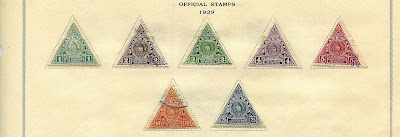Quetzal
Bud's Big BlueBud's Observations
Guatemalans love the quetzal, their national bird. It’s on their
stamps. They named their currency after it. What’s more, they even tattoo it on
interesting body parts (do a Google search: Guatemala quetzal tattoo).
I spotted 104 quetzals on BB’s selection of classical era
Guatemalan stamps. Maybe there are more. It’s quetzalmania!
On my only visit to Guatemala I looked for quetzals. I found
them in my billfold and on the tattooed backs of chicken bus riders, but not in
the air or perched on trees; none were seen in the cloudy mountain forests,
either. I did see whole mountainsides covered by canopies under which leathery
ferns are grown for export as bouquet foliage to Europe and North America. Foreign
owned coffee plantations proliferate. But not quetzals. Their habitat is
shrinking and they don’t reproduce in captivity. The World Wildlife Fund says
they’re endangered.
‘Quetzal’ derives from an ancient Mayan term for tail
feather or, more generally, for precious and beautiful. I hope Guatemalan
efforts toward preserving precious and beautiful quetzals succeed.
Beyond ornithology, Guatemala specializes in overprinted
stamps. BB has spaces for 96 of them.
When riffling through feeder albums, I look for early star
duplex cancels and other fancies.
Census: 291 in BB spaces, 16 tip-ins, 65 on supplement
pages.
Jim's Observations
In 1879, the iconic "Quetzal" design was first issued.
Between 1898-1920, Guatemala was under the dictatorship of Manual Estrada Cabrera, boosted by the support of the United Fruit Company. In 1901, the Guatemalan government hired the United Fruit Company to manage the country's postal service.
Bananas were the primary export of the United Fruit Company, today morphed into Chiquita Brands International. It's chief rival was the Standard Fruit Company, now Dole Foods.
As a result of the heavy handed involvement of these companies in central american governments, the American author O. Henry coined the pejorative term "Banana Republic".
Guatemala Post and BB Checklist
Page 1
1a
1b
1c
Page 2
2a
2b
2c
Page 3
3a
3b
3c
Page 4
4a
4b
4c
4d
Page 5
5a
5b
5c
Page 6
6a
6b
6c
Page 7
7a
7b
7c
Page 8
8a
8b
8c
Page 9
9a
9b
9c
9d
Page 10
10a
10b
10c
Page 11
11a
11b
Supplements
Page 1
Page 2
Page 3
Comments appreciated!

















































Jim, have been away for a bit, glad I checked back on your blog, Guatemala is a favorite of mine.
ReplyDeleteI am intrigued by the National ARms stamps shown on your supplement page two, with some selvage?? Were they sheetlets issued at the Exposition? Also noted what appear to be overprints on some other Arms issues on the Third Supplement page.
Thanks much for sharing these.
Roy, glad you liked Bud’s Guatemala. As the collection that is shown belongs to Bud, hopefully he will respond.
DeleteHi Roy. I believe the two stamps with selvage on supplement page two are cut from newspaper wrappers. On page three, the first of the eight is cut with pinking shears from a postcard and the remaining seven have "telegrafos" overprints.
DeleteThanks Gents, appreciate the info and I enjoy the blog very much.
ReplyDeleteR.